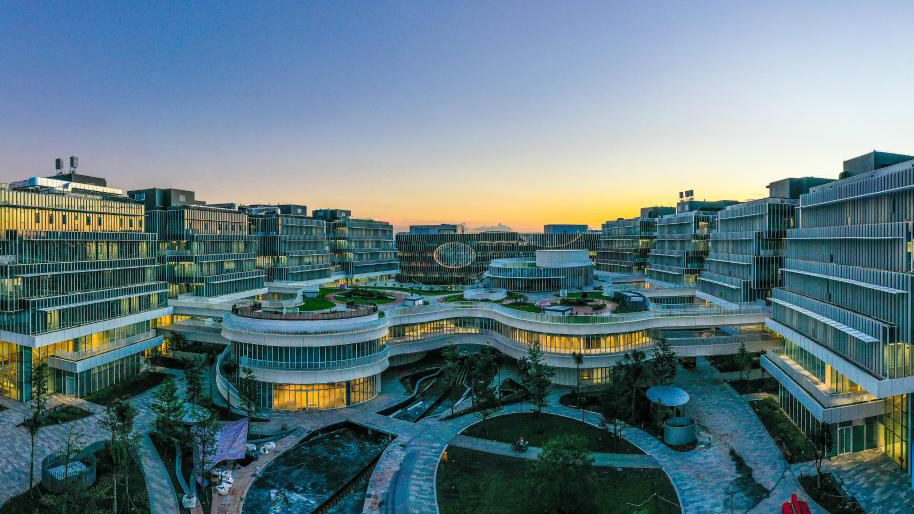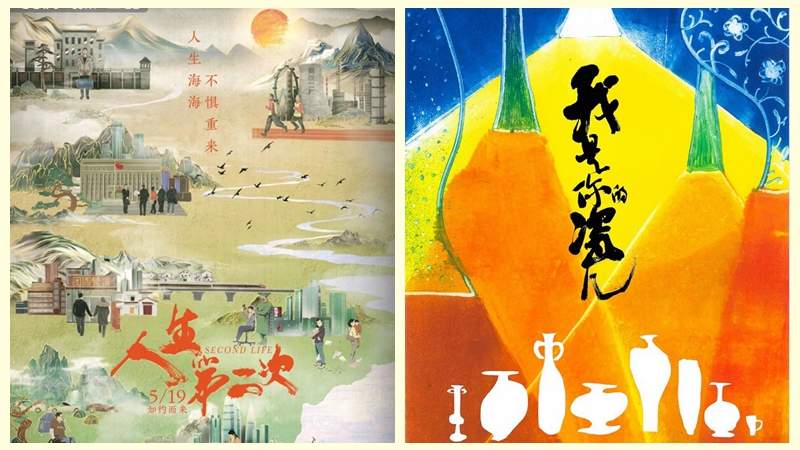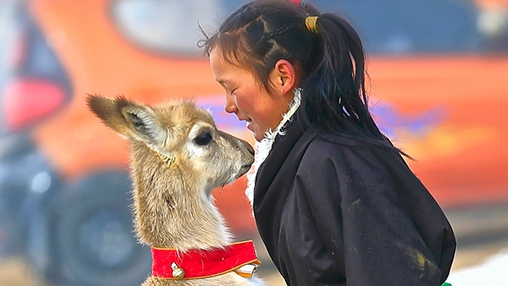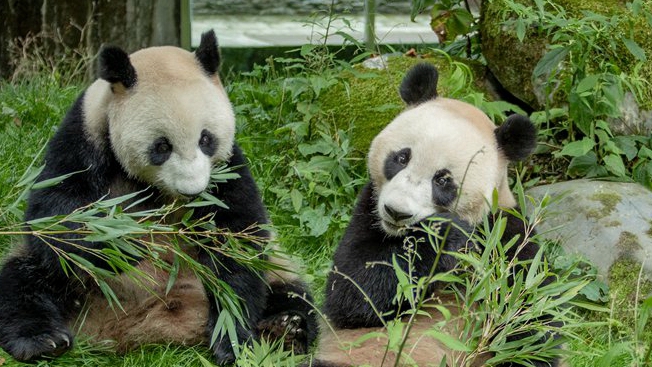China, Pacific island nations foster regional peace and stability
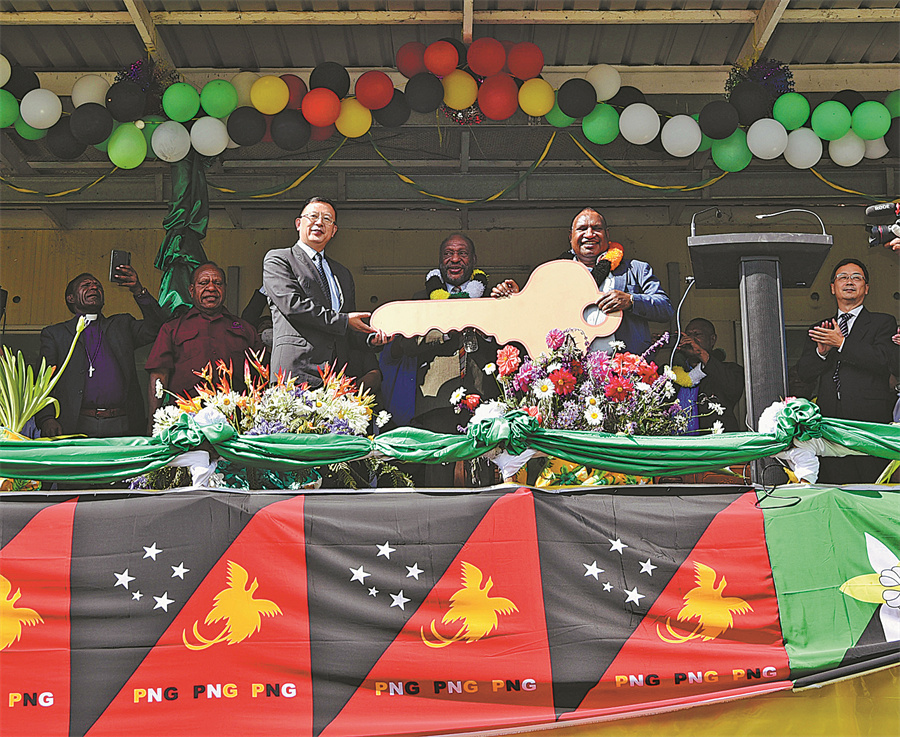
Zeng Fanhua, Chinese ambassador to Papua New Guinea, and Papua New Guinea's Prime Minister James Marape take part in the handover of a new hospital on June 20. XINHUA
Decadeslong links help fight poverty, forge development paths
Diplomatic ties established between China and Pacific island nations in the 1970s have nurtured a common interest in the peace and stability of the Asia-Pacific region.
However, when it comes to providing COVID-19 vaccines to countries such as Papua New Guinea during the pandemic or, more generally, building hospitals and providing development assistance, China's role in the Pacific is generally painted in a negative light by Western media.
Nevertheless, from time to time some grains of truth emerge.
During State Councilor and Foreign Minister Wang Yi's tour of the Pacific in May, The Associated Press asked Fijians what they thought of China.
Georgina Matilda, who works for infrastructure company China Railway, said her job means she can put food on the table for her children.
Another Fijian, Miliane Rokolita, said China's increased presence has benefited people. "They (Chinese) bring us bigger houses. They bring money into Fiji. They are good people," Rokolita told The Associated Press on May 30.
Scattered across the Pacific, these island nations have a natural beauty hard to match anywhere else in the world. But set against this backdrop, they struggle with poverty, poor economic opportunities and rising marine climate change.
In the 1950s and '60s, the region was used by France and the United States to test nuclear weapons, with little compensation paid to those who were displaced.
In its annual report for last year, released on July 28, the UN International Fund for Agricultural Development estimated that more than 418 million people experience hunger in Asia-more than 50 percent of those living in hunger globally. Nearly 3 million of these people live in the Pacific.
China has always maintained that Pacific islands are not the backyard spheres of influence of any one country. It sees each nation as an equal pursuing its own development and economic and social goals.
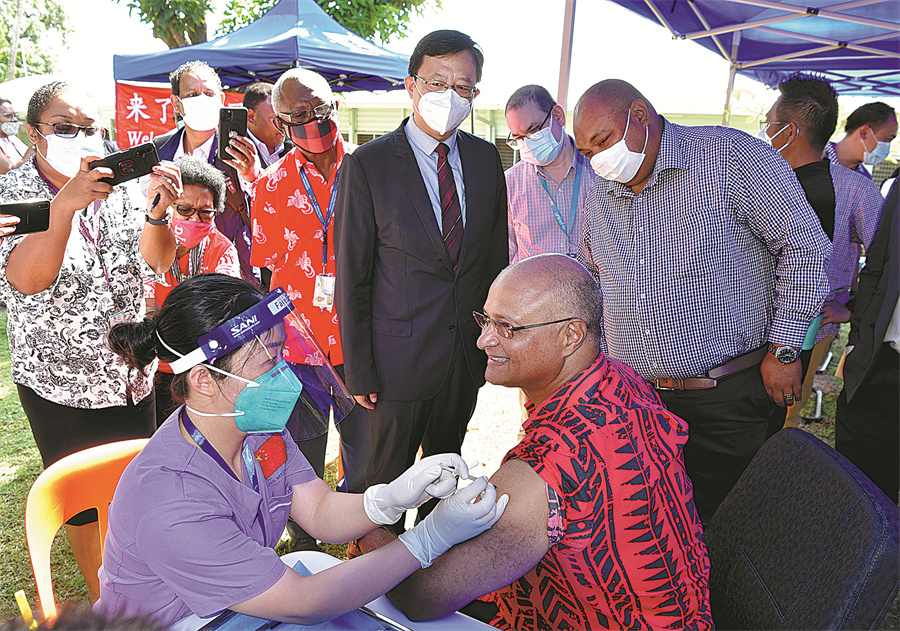
Papua New Guinea's forestry minister receives a COVID-19 vaccination provided by a Chinese medical team in Port Moresby, the country's capital, on July 14 last year. XINHUA
The China Pacific Island Countries Poverty Alleviation and Cooperative Development Center, launched on July 20 in Nanping, Fujian province, aims to cement the already strong ties between Beijing and Pacific island nations.
Analysts view the center as being positive for the Pacific, as it will help in developing peace and stability for the region. It will also strengthen cooperation on poverty alleviation and economic development as these nations cope with numerous challenges, including climate change and the impact of COVID-19.
In his speech at the opening of the center, Xie Feng, vice-minister of foreign affairs, said Pacific island nations are "welcome aboard the express train" of China's development.
Xie described the center as an important step taken by China as it implements the Global Development Initiative to engage in international cooperation on poverty reduction and helps Pacific island countries achieve progress and rejuvenation.
"Poverty alleviation and development are like two wheels of a vehicle and the two wings of a bird, which supplement each other. Poverty alleviation makes way for better development; without development, there will be a return to poverty," Xie said.
"President Xi Jinping solemnly declared at the Ceremony Marking the Centenary of the Communist Party of China that China has built a moderately prosperous society in all respects and has brought about a historic resolution to the problem of absolute poverty.
"China has realized the poverty alleviation goal under the UN 2030 Agenda for Sustainable Development 10 years ahead of schedule, creating a 'China example' of poverty alleviation."
Xie added, "While eradicating poverty domestically, China has also actively fulfilled its international responsibility for poverty alleviation and provided assistance to other developing countries to the best of its ability, and has always been an active advocate and strong promoter of international poverty alleviation and development."
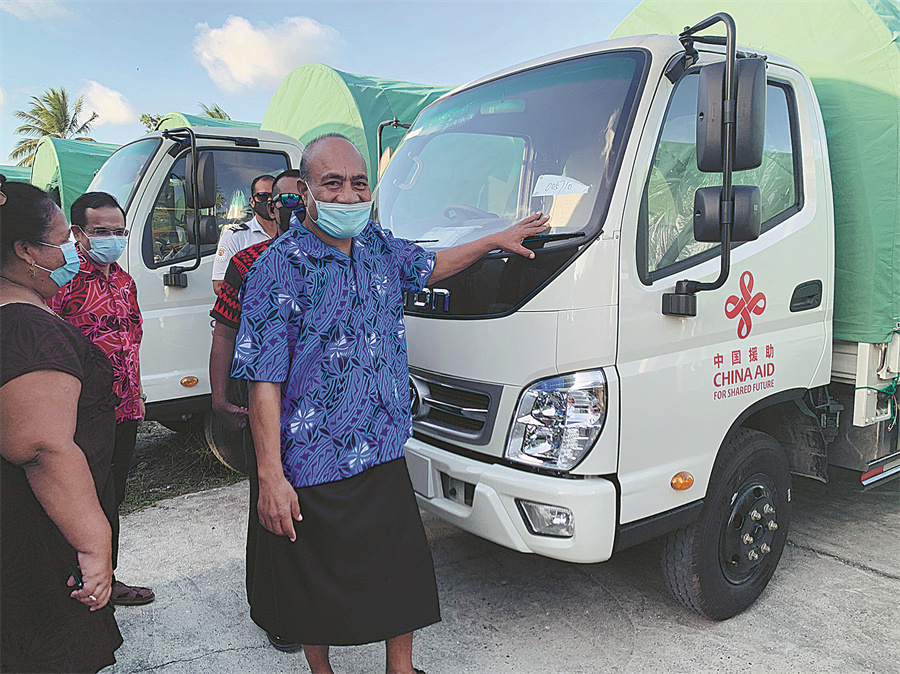
Twenty school buses provided by China arrive in the Pacific island nation of Kiribati in April. XINHUA
Trust established
In a phone conversation with King Tupou VI of Tonga on Sept 24, Xi said that since diplomatic ties between Tonga and China were established, the two countries have deepened "political mutual trust".
Xi stressed that China is ready to expand all-around cooperation with Tonga within the framework of the Belt and Road Initiative, offer economic and technical assistance without any political strings attached, continue to carry out agricultural and technical cooperation projects, and provide assistance for Tongan agricultural and fishery products to enter the Chinese market.
The president emphasized that China collaborates with Pacific island countries on a mutually beneficial and win-win basis.
Xi made the point that China is willing to share its poverty reduction experience and deepen development cooperation with Pacific island countries, including Tonga, and help these nations cope better with major public health events and natural disasters.
When it comes to climate change, China understands the specific concerns of small island developing countries and will support Pacific island nations in improving their ability to tackle this issue.
Lawrence Loh, director of the Center for Governance and Sustainability at the National University of Singapore Business School, believes the Nanping center could be good for the Pacific.
"From a sustainability perspective, the Pacific islands have not been accorded much attention, even recently," he said.
Loh said the center could be an effective platform to address the key challenge of sustainability faced by the Pacific islands.
"It may cover critical marine concerns such as biodiversity protection and pollution mitigation. It may also strengthen the Pacific islands in countering the potential impact of rising sea levels due to climate change," he said.
Chris Devonshire-Ellis, chairman and founding partner of the pan-Asia multidisciplinary professional services company Dezan Shira, said, "It remains to be seen just how effective the center will be in alleviating poverty in the Pacific.
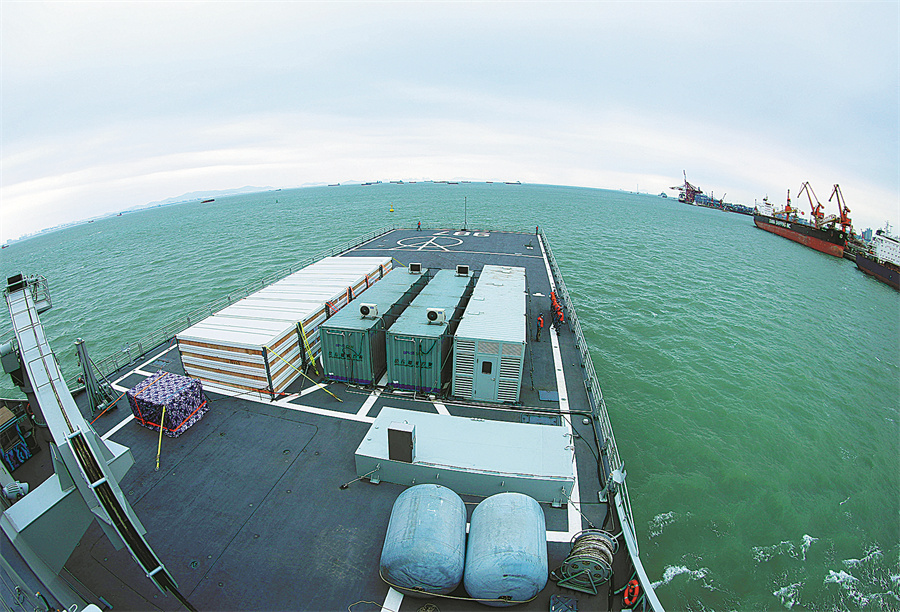
A Chinese naval vessel delivers relief supplies to Tonga on Jan 31. ZHOU YANCHENG/XINHUA
"But any research into the issue is welcome, and it appears that China has reacted to the problems and recognized some of the issues, while more regionalized countries such as New Zealand and Australia, and to some extent the United Kingdom, have not been paying enough attention," he said.
"That has created alarm within their governments, who see the Chinese as potentially interfering and intrusive. A better plan may be to involve everyone in a round table format and work out a collective approach to allay these concerns and pool resources.
"If that is done and definitive action is agreed, then such communal understanding can be promoted and used to assist other island nations facing similar problems."
John Moffat Fugui, the Solomon Islands ambassador to China, who attended the center's opening ceremony with envoys from other Pacific island nations, said he hoped the center would produce tangible results for learning and also share experiences and information on poverty alleviation between China and its Pacific island partners.
"Such experiences could help these countries boost their economies and their peoples' well-being, especially as they grapple with challenges associated with climate change, rising poverty and unemployment, and the social and economic impacts of COVID-19," he said.
Chen Xiaochen, executive deputy director of the Centre for Asia Pacific Studies at East China Normal University in Shanghai, said the Nanping center's launch shows that China is honoring commitments it made during a foreign ministers' meeting in October.
On Oct 21, China and the Pacific island countries with which it has diplomatic relations held their first foreign ministers' meeting via video link.
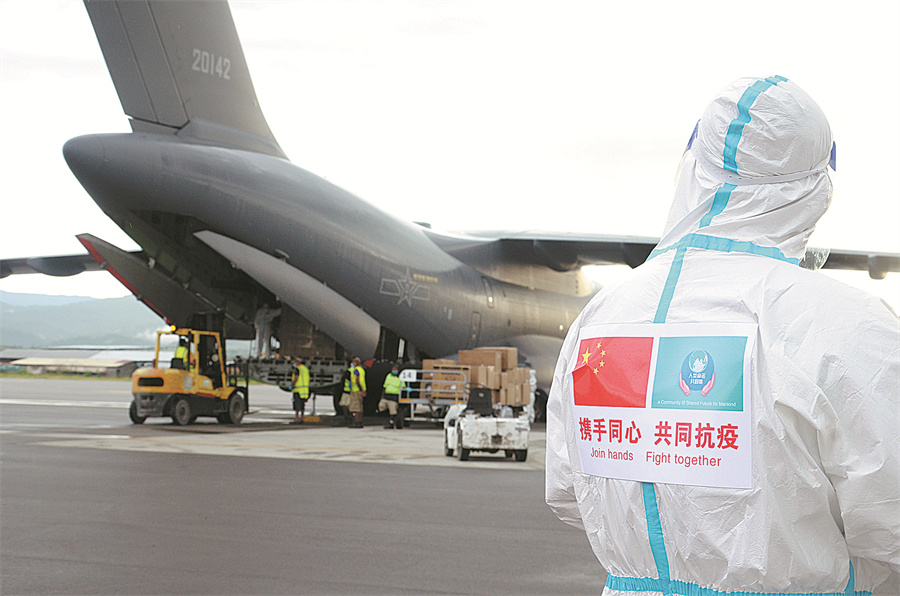
Medical supplies and other relief materials arrive in Honiara, capital of the Solomon Islands, on Feb 18. XINHUA
Vital revenue
Jason Young, associate professor of political science and international relations at Victoria University in Wellington, New Zealand, said, "Pacific island countries are very distant from many markets, and in recent years we've seen Chinese companies take more and more Pacific exports, which provides very important revenue for those economies."
Young, also director of the university's New Zealand Contemporary China Research Center, added: "China has invested in and formed development partnerships for things like infrastructure development and building construction-particularly in the Pacific in terms of climate change resilience and adaptation. These types of infrastructure projects are incredibly important."
He said many countries are helping or working with Pacific island nations to try to deal with poverty issues. "But I think the key thing is that those initiatives need to be owned by Pacific island countries themselves," Young said.
"So, just as China's own poverty alleviation policies were primarily domestic policies with foreign investment and some aid and support from organizations like the World Bank and International Monetary Fund, it's the same with the Pacific-the agency for change needs to be in the Pacific."
Devonshire-Ellis, from Dezan Shira, said poverty alleviation should be based on the ability of people to have a sustainable income.
"That means studying the local economy and its assets, and working out new ways in which existing processes can be streamlined and made more efficient, or new business lines introduced," he said.
"These also need to go hand-in-hand with issues the South Pacific faces, such as rising sea levels and overexploitation of natural resources. It will be interesting to see what China proposes."
He said climate change affects everyone differently, acknowledging that Pacific island nations are particularly vulnerable to rising sea levels and extreme weather events.
"Technologies to allow these nations to cope with this have still not been thought through, and neither has the resettlement situation. The Maldives in the Indian Ocean has already approached India to buy land for the resettlement of some of the islanders when necessary," Devonshire-Ellis said.
China has never made secret its desire to safeguard peace and stability in the Asia Pacific region. This aim was clearly outlined in the nation's Position Paper on Mutual Respect and Common Development with Pacific Island Countries issued by the Ministry of Foreign Affairs on May 30.
The paper states that relations between China and Pacific island countries have flourished, while exchanges and cooperation have grown in more than 20 fields, including trade, investment, ocean affairs, environmental protection, disaster preparedness and mitigation, poverty alleviation and health.
"China has implemented nearly 500 complete plant projects, technical assistance, in-kind assistance and concessional loan projects in Pacific island countries, helped them build important infrastructure such as roads, bridges, wharves, hospitals, schools and stadiums, and trained about 10,000 professionals in various fields," the paper said.
As well as burgeoning trade volumes with the region, China has played a key role in providing medical assistance to Pacific island nations, and has signed Belt and Road cooperation memorandums of understanding with all 10 such countries with which it has diplomatic relations.
Tourism is also a key part of the relationship. Before the pandemic emerged, nearly 100,000 Chinese tourists traveled to the South Pacific annually.
Photos
Related Stories
- China has every right to talk to Pacific nations: New Zealand's Maori Party president
- Commentary: China, Pacific island countries -- friends in need, indeed
- China, Vanuatu reach 5-point consensus on bilateral ties, int'l cooperation
- China encourages airlines to launch air routes to Pacific island countries
- China to appoint special envoy, deepen practical cooperation with Pacific island countries
Copyright © 2022 People's Daily Online. All Rights Reserved.






